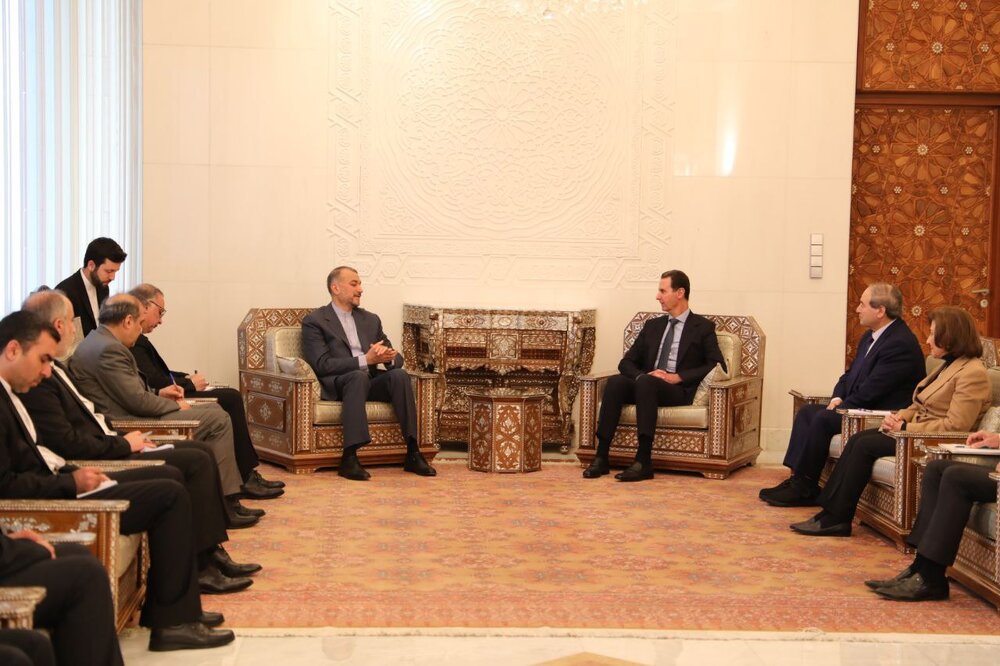Iran, Syria reiterate strength of ties

TEHRAN – After a visit to Lebanon, Iranian Foreign Minister Hossein Amir Abdollahian traveled to Syria amid a flurry of diplomatic overtures in the region aimed at reconciliation.
In Damascus, Amir Abdollahian was received by his Syrian counterpart, Faisal Mikdad. He then held a meeting with Syrian President Bashar Assad.
In the meeting with President Assad, the Iranian foreign minister stressed that the Islamic Republic of Iran considers Syria’s security and progress as its own security and progress and will continue its strong support for Damascus.
This comes against a backdrop of regional efforts to build bridges between Syria and the Arab world on the one hand and between Syria and Turkey on the other hand. To this end, President Assad paid a visit to the United Arab Emirates in March last year. Also, UAE Foreign Minister Sheikh Abdullah bin Zayed visited Damascus in early January in further sign of growing ties between Syria and the UAE.
In parallel, Syria and Turkey are inching toward reproachment after years of tensions. Recently, the defense ministers of Syria, Turkey, and Russia held a joint meeting in Moscow in what was seen as preparation for a meeting between the presidents of Turkey and Syria. Contacts between Syria, the UAE, Turkey, and Russia are underway for greater thaw, with Turkish officials seem to be keener to open a new chapter with Syria.
In the meantime, there have been some speculations in the Arab media that this trend of rapprochement could train relations between Tehran and Damascus.
But Amir Abdollahian made it clear that Iran-Syria relations are strong and will continue to grow. In his meeting with President Assad, the Iranian foreign minister pointed to good and close consultations and cooperation between the officials of the two countries, especially at the level of foreign ministries, and said his visit to Syria was aimed at continuing and completing exchanges of views between Tehran and Damascus over issues of mutual interest at bilateral, regional and international levels.
Amir Abdollahian also expressed pleasure with the expanding trend of Syria’s foreign ties, saying this shows the importance and significant position of Syria in the region, according to a statement by the Iranian foreign ministry.
He stressed that the Islamic Republic of Iran has always put emphasis on political solution instead of war, and, as a result, Tehran welcomes the positive developments in the political ties of Syria with other countries.
Observers believe that while Iran-Syria ties remain strong, some parties who previously tried to overthrow the Syrian government through war could now be working to entice Syria into distancing itself from Iran. Those who once used a stick in their relations with Syria, observers say, now may be offering carrots. But this approach is unlikely to drive a wedge between Tehran and Damascus.
President Assad has invited his Iranian counterpart, Ayatollah Ebrahim Raisi, to pay a visit to Damascus. And Amir Abdollahian expressed confidence that the trip will pave the way for further bolstering friendly and brotherly relations between the two nations in different spheres.
Assad emphasized the importance of President Raisi’s upcoming visit to Syria, noting that Damascus is ready and firmly resolved to make joint efforts and help make the visit as much successful as possible.
He pointed out that the Islamic Republic of Iran is the closest country to Syria and “it stood by us in the war and we will not forget the Islamic Republic of Iran’s support.”
The Syrian president underlined that the Islamic Republic of Iran is Syria’s partner, adding, “We have been together and will support each other in different fields.”
